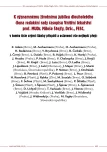-
Medical journals
- Career
Liver cirrhosis and its treatment
Authors: J. Lata; T. Vaňásek; O. Stibůrek
Authors‘ workplace: Interní hepatogastroenterologická klinika Lékařské fakulty MU a FN Brno, pracoviště Bohunice, přednosta prof. MUDr. Jan Lata, CSc.
Published in: Vnitř Lék 2009; 55(9): 774-778
Category: 80th Birthday - prof. MUDr. Miloš Štejfa, DrSc., FESC
Overview
Cirrhosis is an end-stage liver disease. It is necessary to always search for the cause, attempt to initiate suitable causal treatment and assess the severity of hepatopathy by evaluating hepatic functional reserve (according to the Child-Pugh classification). It is necessary to continually monitor possible complications of cirrhosis, some can be prevented. Regular clinical and laboratory monitoring as well as ultrasound and endoscopic examinations are required. The paper discusses the treatment of the disease as well as its complications. Cure can only be achieved with a liver transplant; this option should be evaluated by a hepatologist in each patient with functional classification B or with serious complications of portal hypertension mentioned above. Treatment standards compiled by the Czech Society of Hepatology (http://www.ceska-hepatologie.cz) offer the basic algorithms of correct diagnosis and treatment.
Key words:
liver cirrhosis – portal hypertension – bleeding oesophageal varices – ascites – spontaneous bacterial peritonitis – hepatorenal syndrome – hepatocellular carcinoma
Sources
1. Sherlocková S, Dooley J. Nemoci jater a žlučových cest. 11. vyd. Hradec Králové: Olga Čermáková publishing 2004.
2. Brůha R, Drastich P, Hůlek P et al. Diagnostika a léčba jaterní encefalopatie. Vnitř Lék 2006; 52 : 85–86.
3. Parés A, Caballería I, Rodés J et al. Long-term effects of ursodeoxycholic acidin primary biliary cirrhosis: results of a double-blind controlled multicentric trial. UDCA-Cooperative Group from the Spanish Association for the Study of the Liver. J Hepatol 2000; 32 : 561–566.
4. Jacobs BP, Dennehy C, Ramirez G et al. Milk thistle for the treatment of liver diseases: a systematic review and meta-analysis. Am J Med 2002; 113 : 506–515.
5. Brůha R, Mareček Z. Esenciální fosfolipidy v léčbě jaterní encefalopatie. Vnitř Lék 2000; 46 : 199–204.
6. Lata J, Kroupa R, Novotný I et al. Akutní krvácení z horní části gastrointestinálního traktu. Vnitř Lék 2009; 55 (Suppl 1): S29–S33.
7. Imazu H, Seewald S, Omar S et al. Endoscopic Treatment for Portal Hypertension: What’s New in the Last 12 Months? Endoscopy 2005; 37 : 116–121.
8. Møller S, Henriksen JH, Bendtsen F. Ascites: Pathogenesis and therapeutic principles. Scand J Gastroenterol 2009; 8 : 902–911.
9. Khan J, Pikkarainen P, Karvonen AL et al. Ascites: Aetiology, mortality and the prevalence of spontaneous bacterial peritonitis. Scand J Gastroenterol 2009; 8 : 970–974.
10. Brůha R, Balihar K, Drastich P et al.Doporučený postup pro diagnostiku a léčbuhepatorenálního syndromu. Vnitř Lék 2006; 52 : 649–650.
11. Rougier P, Mitry E, Barbare JC et al. Hepatocellular carcinoma (HCC): an update. Semin Oncol 2007; 34 (2 Suppl 1): S12–S20.
12. Rodríguez-Roisin R, Krowka MJ. Hepatopulmonary Syndrome – A Liver-Induced Lung Vascular Disorder. N Engl J Med 2008; 358 : 2378–2387.
Labels
Diabetology Endocrinology Internal medicine
Article was published inInternal Medicine

2009 Issue 9-
All articles in this issue
- Myocarditis
- Heart transplantation
- Hypertension combination therapy with rennin-angiotenzin system blockers
- Cholesterol levels according to age
- Echocardiography in patients with ischemic heart disease
- Transplantation of haematopoietic cells
- B-cell chronic lymphocytic leukaemia and the similar states
- Tako-tsubo cardiomyopathy
- Reducing food salt content – a neglected approach to hypertension prevention and treatment in the population
- To treat or not to treat with statins patients with chronic heart failure?
- How to improve response to cardiac resynchronization therapy?
- Monitoring of cardiovascular risk factors in patients with diabetes type 2
- Prediabetes – 2009
- Some current views on chronic ischemic heart disease
- Target values in hypertension treatment. Will they apply in older patients with hypertension, diabetics and in patients with IHD?
- AT1-blockers in the treatment of hypertension
- The importance of autologous transplantation in multiple myeloma
- Liver cirrhosis and its treatment
- Surgical treatment of pulmonary embolism
- The most common heart valve diseases: aortic stenosis and mitral regurgitation. A few comments on guidelines and recommendations by societies of cardiology
- Diabetes and vascular diabetic disease
- Internal Medicine
- Journal archive
- Current issue
- Online only
- About the journal
Most read in this issue- Cholesterol levels according to age
- B-cell chronic lymphocytic leukaemia and the similar states
- Liver cirrhosis and its treatment
- Transplantation of haematopoietic cells
Login#ADS_BOTTOM_SCRIPTS#Forgotten passwordEnter the email address that you registered with. We will send you instructions on how to set a new password.
- Career

